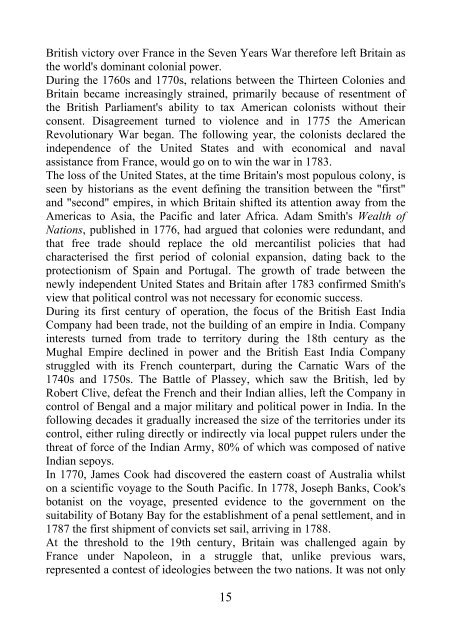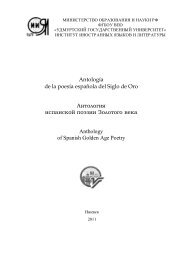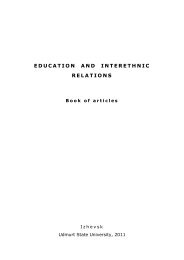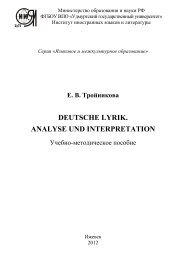Ð.Ð. ÐелинÑÐºÐ°Ñ ENGLISH-SPEAKING COUNTRIES
Ð.Ð. ÐелинÑÐºÐ°Ñ ENGLISH-SPEAKING COUNTRIES
Ð.Ð. ÐелинÑÐºÐ°Ñ ENGLISH-SPEAKING COUNTRIES
You also want an ePaper? Increase the reach of your titles
YUMPU automatically turns print PDFs into web optimized ePapers that Google loves.
British victory over France in the Seven Years War therefore left Britain as<br />
the world's dominant colonial power.<br />
During the 1760s and 1770s, relations between the Thirteen Colonies and<br />
Britain became increasingly strained, primarily because of resentment of<br />
the British Parliament's ability to tax American colonists without their<br />
consent. Disagreement turned to violence and in 1775 the American<br />
Revolutionary War began. The following year, the colonists declared the<br />
independence of the United States and with economical and naval<br />
assistance from France, would go on to win the war in 1783.<br />
The loss of the United States, at the time Britain's most populous colony, is<br />
seen by historians as the event defining the transition between the "first"<br />
and "second" empires, in which Britain shifted its attention away from the<br />
Americas to Asia, the Pacific and later Africa. Adam Smith's Wealth of<br />
Nations, published in 1776, had argued that colonies were redundant, and<br />
that free trade should replace the old mercantilist policies that had<br />
characterised the first period of colonial expansion, dating back to the<br />
protectionism of Spain and Portugal. The growth of trade between the<br />
newly independent United States and Britain after 1783 confirmed Smith's<br />
view that political control was not necessary for economic success.<br />
During its first century of operation, the focus of the British East India<br />
Company had been trade, not the building of an empire in India. Company<br />
interests turned from trade to territory during the 18th century as the<br />
Mughal Empire declined in power and the British East India Company<br />
struggled with its French counterpart, during the Carnatic Wars of the<br />
1740s and 1750s. The Battle of Plassey, which saw the British, led by<br />
Robert Clive, defeat the French and their Indian allies, left the Company in<br />
control of Bengal and a major military and political power in India. In the<br />
following decades it gradually increased the size of the territories under its<br />
control, either ruling directly or indirectly via local puppet rulers under the<br />
threat of force of the Indian Army, 80% of which was composed of native<br />
Indian sepoys.<br />
In 1770, James Cook had discovered the eastern coast of Australia whilst<br />
on a scientific voyage to the South Pacific. In 1778, Joseph Banks, Cook's<br />
botanist on the voyage, presented evidence to the government on the<br />
suitability of Botany Bay for the establishment of a penal settlement, and in<br />
1787 the first shipment of convicts set sail, arriving in 1788.<br />
At the threshold to the 19th century, Britain was challenged again by<br />
France under Napoleon, in a struggle that, unlike previous wars,<br />
represented a contest of ideologies between the two nations. It was not only<br />
15














